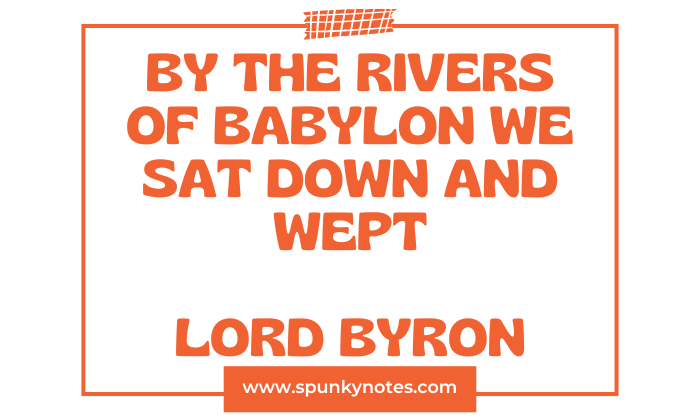
Q. Critically explain the poem By the Rivers of Babylon We Sat Down and Wept by Lord Byron.
Babylon was an ancient city located near the Euphrates River in what is now modern-day Iraq. It is one of the most famous cities from ancient Mesopotamia.
Babylon’s history spans thousands of years, and at its peak, it was one of the world’s largest and most influential cities.
The city was well-known for its impressive architecture, particularly the Hanging Gardens, which was recognized as one of the Seven Wonders of the Ancient World.
Babylon also made significant progress in fields such as law, science, and literature, showcasing a period of substantial cultural and intellectual advancement.
Babylonian conquest of Jerusalem in 586 BCE. Under King Nebuchadnezzar II, the Babylonian Empire laid siege to Jerusalem, ultimately destroying the city, including Solomon’s Temple, and deporting many inhabitants to Babylon.
Stanza 1
We sat down and wept by the waters
Of Babel, and thought of the day
When our foe, in the hue of his slaughters,
Made Salem’s high places his prey;
And ye, oh her desolate daughters!
Were scattered all weeping away.
We sat down and wept by the waters Of Babel
The opening lines set the scene by the rivers of Babylon, where the exiled Israelites sit and weep. This image captures their profound grief and despair, far from their homeland.
and thought of the day
When our foe, in the hue of his slaughters
The poem then transitions to a reflection on the day Jerusalem was conquered. The use of “hue of his slaughters” metaphorically describes the violence and bloodshed of the attack, emphasizing the brutality and the overwhelming loss of life.
Made Salem’s high places his prey
“Salem” is an ancient name for Jerusalem, and “high places” refers to important religious and cultural sites within the city, likely including the Temple.
The enemy occupied these sacred sites, symbolizing not just physical destruction but a profound spiritual and cultural violation.
And ye, oh her desolate daughters!
Were scattered all weeping away
The stanza concludes by addressing the people of Jerusalem, particularly its “desolate daughters.” This personification of the city’s inhabitants as daughters emphasizes their vulnerability and suffering.
The scattering of the people, weeping as they go, portrays the diaspora of the Israelites who faced exile, dispersing in anguish and leaving behind their lives, history, and identity.
Stanza 2
While sadly we gazed on the river
Which rolled on in freedom below,
They demanded the song; but, oh never
That triumph the stranger shall know!
May this right hand be withered for ever,
Ere it string our high harp for the foe!
It tells about the people who find a quiet rebellion even in their defeat and capture. They stand by a river, symbolizing the flow of their lives and freedoms that seem so out of reach.
Their captors demand a song of their homeland, perhaps a song of victory or joy that once was. But there’s a powerful refusal.
Ere it string our high harp for the foe!
Before it (my right hand) plays our important harp for the enemy! This phrase combines a declaration of defiance with a symbolic gesture.
The idea of performing such intimate pieces of their identity for those who oppress them is unthinkable. It’s a moment of defiance: better to let their hand lose its ability to create music than to give in and entertain their captors.
This act of refusal isn’t just about a song; it’s about preserving their dignity, identity, and culture’s sanctity against those who would see it diminished.
Stanza 3
On the willow that harp is suspended,
Oh Salem! its sound should be free;
And the hour when thy glories were
ended
But left me that token of thee:
And ne’er shall its soft tones be blended
With the voice of the spoiler by me!
On the willow that harp is suspended
A harp hanging on a willow tree symbolizes deep sorrow. In ancient traditions, willows often represent mourning or loss, and the image of a harp hanging unused suggests a state of grief or suspension of joy.
Oh Salem! its sound should be free
The speaker recalls Jerusalem (Salem), yearning for the time when the city was free and vibrant. They believe the harp’s music, symbolizing Jerusalem’s spirit, should still be played freely, not in captivity or silence.
And the hour when thy glories were ended
But left me that token of thee
This line reflects on the moment Jerusalem fell and lost its glory. The harp remains a token or reminder of the city’s once greatness, serving as a link to the past.
And ne’er shall its soft tones be blended
With the voice of the spoiler by me!
The speaker vows never to let the harp’s gentle music be mixed with the voice of the enemy (the spoiler). This is a declaration of resistance; the speaker refuses to use the harp to entertain or serve their captors.
It’s a commitment to preserve the purity and integrity of their cultural heritage, ensuring it remains untouched by the hands or influence of those who destroyed their homeland.

